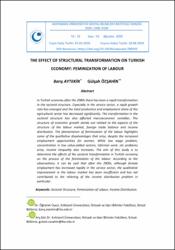THE EFFECT OF STRUCTURAL TRANSFORMATION ON TURKISH ECONOMY: FEMINIZATION OF LABOUR
Abstract
In Turkish economy after the 2000s there has been a rapid transformationin the sectoral structure. Especially in the service sector, a rapid growthrate has emerged and the total production and employment share of theagricultural sector has decreased significantly. The transformation in thesectoral structure has also affected macroeconomic variables. Thestructure of economic growth stands out related to the aspects of thestructure of the labour market, foreign trade balance and incomedistribution. The phenomenon of feminization of the labour highlightssome of the qualitative disadvantages that arise, despite the increasedemployment opportunities for women. While low wage problem,concentration in low value-added sectors, informal work, etc problemsarise, income inequality also increases. The aim of this study is todetermine the effects of the sectoral transformation in Turkish economyon the process of the feminization of the labour. According to theobservations, it can be said that after the 2000s, although femaleemployment has increased rapidly in the service sector, the qualitativeimprovement in the labour market has been insufficient and has notcontributed to the relieving of the income distribution problem inparticular. Türkiye ekonomisinde 2000’li yıllardan sonra sektörel yapıda hızlı bir dönüşüm ortaya çıkmıştır. Özellikle hizmet sektöründe hızlı bir büyüme oranı ortaya çıkmış, tarım sektörünün toplam üretim ve istihdam payı dikkate değer biçimde azalmıştır. Sektörel yapıda ortaya çıkan dönüşüm makroekonomik değişkenleri de etkilemiştir. İktisadi büyümenin niteliği, İşgücü piyasasının yapısı, dış ticaret dengesi, gelir dağılımı vb. bu açıdan öne çıkmaktadır. İşgücünün feminizasyonu olgusu, kadınların istihdam olanaklarının artmasına rağmen, niteliksel olarak ortaya çıkan bazı olumsuzlukları vurgulamaktadır. Düşük ücret sorunu, katma değeri düşük sektörlerde yoğunlaşma, kayıtdışı çalışma vb. problemler ortaya çıkarken gelir eşitsizlikleri de artmaktadır. Bu çalışmanın amacı Türkiye ekonomisinde sektörel yapıda ortaya çıkan dönüşümün, işgücünün feminizasyonu sürecine etkilerini ortaya çıkarmaktır. Elde edilen bulgulara göre, 2000’li yıllardan sonra hizmetler sektöründe kadın istihdamı hızlı bir şekilde artmasına rağmen, işgücü piyasasında niteliksel iyileşmenin yetersiz kaldığı ve özellikle gelir dağılımı sorununun çözümlenmesine katkı sağlamadığı anlaşılmaktadır.
Source
Adıyaman Üniversitesi Sosyal Bilimler Enstitü DergisiVolume
0Issue
35URI
https://doi.org/10.14520/adyusbd.700292https://app.trdizin.gov.tr/makale/TkRVeU1Ua3lNZz09
https://hdl.handle.net/20.500.11857/1684
Collections
- Makale Koleksiyonu [443]
- TR-Dizin İndeksli Yayınlar Koleksiyonu [1037]



















